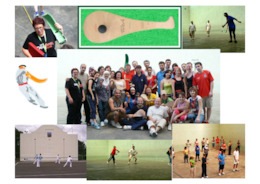Toolbox — For Training and Youth Work
All new tools in your inbox: Be the first to know about new tools for learning with our e-mail notifications.
Exercise
Basque Pelota Sport; A tool for intercultural learning
To propose a Learning process to diffuse the Basque Pelota Sport on an international level and in an intercultural context
Description of the tool
The workshop starts with a presentation of the material and the field followed by some demonstrations of the material used (by participants)
Each person will take a material and he/she will try to explain what it is its significance and use in the game. They should also explain how to use it in the game.
Everyone should understand that you need different kind of materials and resources to play Pelota – especially for different age groups.
After a warming Up can be done to prepare the players physically and to do a prevention from physical injuries. Some exercises can include: Jogging, jumping, Stretching, Circular movement with the group.
After small exercises to how play Pelota are done:
1- Form a circle and the middle person will throw the ball to the person in the circle. A tiny circle with chalk will be drawn to limit the movement of the person in the middle.
2- Exercise to make two lines with people with pala and pass the ball forward and join the back of the line again.
3- Start close to the wall with the ball, then increase the distance and again increase the distance. Do this again with the pala to change the distance from the wall.
4- Find a focus on the wall where all participants will use as a target. All participants will try to hit the target keeping in mind their team mates and not to hit/injure them while trying to reach this common target.
Full Exercise with Ball and Pala among two people.
One person in front of the wall will start playing with the ball and the pala and then after people will join one by one to play. We can see that everyone can play together at the same time against the wall.
At the end a small tournament can be organized for the players by group of two for a duration of 20 minutes to give them the chance to practice this sport.
Disclaimer
SALTO cannot be held responsible for the inappropriate use of these training tools. Always adapt training tools to your aims, context, target group and to your own skills! These tools have been used in a variety of formats and situations. Please notify SALTO should you know about the origin of or copyright on this tool.
Tool overview

http://toolbox.salto-youth.net/1242
This tool is for
Participants of the training from Program Countries, Meda, South East Europe,Eastern Europe and Causasus.
and addresses
EuroMed, Intercultural Learning, South-East Europe, Eastern Europe and Caucasus
It is recommended for use in:
Action 3.1 (Cooperation with the Neighbouring Partner Countries)
Materials needed:
- Balls: different types, different color and different speeds Example: Tennis Ball, Made up balls, White balls, plastic, black special ball ( the LATEX Ball)
- Pala: Different kinds of Pala; Different kinds of Tennis Raquette.
- Health and Safety material: Glasses and kind of stick Bandages, Plastic Gloves and protection for hands. Tape and warm up Gel, sticks.
Duration:
2 hours
Behind the tool
The tool was created by
the participants and the trainers of the LTTC: "Traditional Sports and Games; a tool in intercultural learning"
in the context of
It is a tool that has been used during the first phase of this long term training course organized by the Franch National Agency and Salto EuroMed and after it has been used in many youth exchanges that were worked on during and after this training course
The tool has been experimented in
LTTC, Youth Exchange
The tool was published to the Toolbox by
Soha El Jammal (on 21 September 2010)
and last modified
22 September 2010
Comments
No comments have been posted yet.
If you want to comment on this tool, you need to be signed in with your MySALTO account. Sign in now